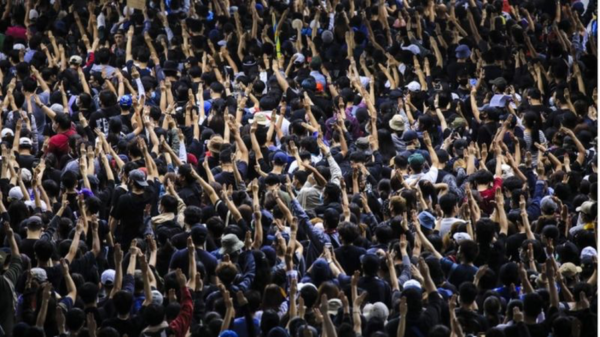
Advocates for Human Rights is proud to present the Spotlights Series, a forum for essays and opinion pieces written by Harvard Law School students and alumni calling attention to pressing domestic and international human rights issues. If you are a Harvard Law student or alumni and would like to contribute a piece to Spotlights, please contact Sondra Anton (santon@jd22.law.harvard.edu) or Ikram Ais (iais@llm21.law.harvard.edu).
Please note that the views and opinions expressed in Spotlight essays are those of the authors and do not necessarily reflect the official policy or position of HLS Advocates for Human Rights.

Photo credit: Kraisorn Ruengkul
It is only natural for people to associate democracy with a country that affords its citizens freedom of expression. This particular freedom serves as a foundational pillar of democracy, allowing citizens to voice their concerns regarding the state of affairs in their country. Authorities must run the country in a manner that accounts for these concerns, with the ultimate purpose of bringing about the greater good. After all, for democracy to flourish and prosper, the government must adhere to calls from the governed.
While the above may seem commonsensical, the exact opposite appears all too common in numerous countries, among which stands Thailand.
Thailand is known as a tourist hotspot with a thriving economy, readily greeting foreigners with warmth and kindness. But it may surprise some that Thailand is being governed by a repressive regime that rules the country without regard to rule of law and human rights.
Thailand’s development of democracy has followed a rough path. Since 1932–the year in which Thailand first became “democratic”– there have been thirteen coups (not accounting for nine other failed attempts). The most recent coup took place in 2014, led by the then-commander-in-chief of the Royal Thai Army, Prayut Chan-O-Cha. With the entire army rallied behind him, he easily overthrew the elected Yingluck administration.[1] To nobody’s surprise, a political purge swiftly began. A series of violent incidents targeting political dissidents occurred, spelling an end to freedom of expression. Many were either forced into exile or so-called “attitude adjustment camps”. Some were brutally attacked and left unconscious. And perhaps, the cruelest of all, some dissidents were victims of enforced disappearance leaving a scarring wound for their relatives, who fear the uncertain fate of their beloved ones. This list of human rights abuses continues to grow.
But with all this brutality, Thai people remained resilient, holding out hope for the general election promised by the junta. Nevertheless, it took roughly five years for that promise to be realized. And when the election finally occurred in 2019, to the Thai people’s dismay, it appears to have served merely as a political tool for the junta to transform themselves into an “electorally justified” government. There were many irregularities, including electoral rules that were issued to facilitate the grip on power by the military. Most notable is a Section 272 of the Constitution, which allows the 250 senators appointed by the junta to take part in selecting a politician to fill the country’s highest office. As a result, the junta’s leader, Prayut Chan-O-Cha, received the most votes and became Thailand’s current prime minister.
Even though the government’s appearance is now that of a democracy, it is, in substance, authoritarian. Much of the legislation which came into force before the election is still in effect. These laws empower the junta to circumvent legitimate judicial processes and suppress its critics. For example, upon any finding of an action that may be deemed a threat to national security or is in violation of, among other laws, any of the junta’s orders, government officials can subpoena such a person to come in for interrogation, arrest them, enter private residences, and so on. All of this can be done without obtaining a court order or warrant.[2] Moreover, officials retain the power to ban media outlets from reporting and publishing news coverage that is deemed inaccurate or may invoke fear. In doing so, the officials may stipulate conditions and/or a timeline for which the ban remains in effect.[3]
After the 2019 election, political suppression continues. For example, a pro-democracy party–the Future Forward Party–was recently dissolved by the Constitutional Court of Thailand on baseless grounds in an attempt to silence the opposition.[4]
Resulting from their contempt for how the government handled critiques and suppressing free speech, Thai university students took to the streets to call for an end to this repressive era. Little did they know that their exercising of the right to peaceful assembly would be met with force. The government has used several tactics ranging from issuing warrants to the student orators to throwing them in jail.
Fifteen activists are facing criminal charges. Six student activists were abducted by government officials in an attempt to stop the protest. The government must be held accountable. But those who committed such acts walk freely as if nothing had ever happened. Recently, on October 15th, 2020, the government issued a “special” emergency decree which greatly expands the power of the government to carry out various sorts of action it deems fit. For example, the government has moved to investigate and halt media coverage of four well known online news outlets that cover the political demonstrations extensively: The Standard, Prachathai, Voice TV, and The Reporter. And in a separate order, the government banned the use of certain roads and public transportation in an attempt to quell the protests. These declarations cement the government’s indifference to the rule of law. Moreover, the prominent protest leaders, including Anon Nampa, Parit Chiwarak, and Panusaya Sithijirawattanakul, were arrested.[5]
Many things can be attributed to this disregard of the rule of law. But one thing stands out: The Thai media outlets deliberately ignored these stories. After all, the government can use legal tools at its disposal to silence these new stations, if it so wishes.[6] The illegitimacy of the government and their continuing oppression elude the majority of Thai people, most of whom subscribe mainly to the national news program. To hold the government accountable and denounce the use of force, its illegitimacy must be widely known. When people are informed, they can collectively call on the government to respect human rights. Only then we can achieve freedom of expression where people’s voices are heard and accounted for.
As a human rights-conscious Thai lawyer, I cannot stand idly by, witnessing my fellow Thais being subjected to the government’s unjust violence. I write this post with a heavy heart but not devoid of hope, seeking to bring to the attention of the Harvard Law School community what is happening in Thailand. Just last week, Prime Minister Chan-O-Cha addressed the public, painting the protesters as aggressors, contrary to the evidence. His government enjoys unlimited resources and media channels to steer the public in whichever way he wants. But we cannot say the same about the protesters. Now more than ever, the fate of Thai people’s freedom of expression is at grave peril. And, to achieve democracy and to escape from this repressive cycle, we need your help. Help us to spread the word. Reach out to those who you think can help us and raise your voice. Be our guardian of liberty.
[1] Yingluck Shinawatra was the first female prime minister of Thailand.
[2] Clause 4 of the Notification of the National Council for Peace and Order 3/2558 (2015) Re: Maintaining Peace and Order.
[3] Clause 5 of the Notification of the National Council for Peace and Order No. 3/2558 (2015) Re: Maintaining Peace and Order.
[4] Several other political parties were recently acquitted of this charge. Only the Future Forward Party (the most vocal critique of the government) was dissolved on this ground. See https://www.matichon.co.th/politics/news_2359261
[5] https://www.bbc.com/news/world-asia-54548988
[6] Clause 5 of the Notification of National Council for Peace and Order No. 3/2558 (2015) Re: Maintaining Peace and Order.

Pongnut Thanaboonchai received his Master of Laws (LLM) from Harvard Law School in 2020. Originally from Thailand, Pongnut previously studied at Thammasat University and worked as a lawyer at an international law firm in Bangkok. He also served on Bangkok’s Diversity and Inclusion Program committee to promote gender diversity and a culture of inclusion in the workplace. Pongnut is now pursuing a career focused on the intersectionality of human rights and technology.
